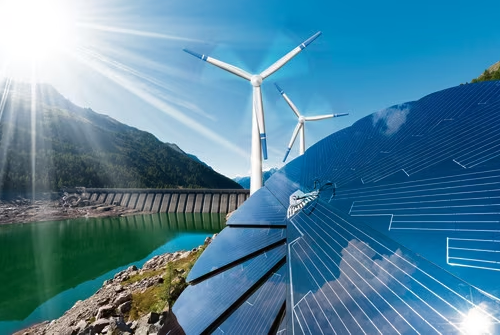In Short : A report indicates that the rollout of renewables in France is progressing too slowly to meet EU targets. This highlights a potential challenge in aligning the country’s renewable energy development with broader European Union goals. It underscores the need for accelerated efforts to transition toward sustainable energy sources and meet environmental targets.
In Detail : France is lagging in its initial renewable energy targets for 2023, and while it’s set to increase by 2030, it won’t be enough to meet EU targets according to French Renewable Energy Observatory figures published on Thursday.
France saw a faster rate of renewables deployment from 2021, but things slowed down from 5.3 gigawatt (GW) to 4.5 GW between 2022 and 2023.
This is a pace that “keeps the country behind its targets”, the French Renewable Energy Observatory said in a statement published on Thursday (25 January).
“With a 28% share of renewable energy in its electricity consumption in 2022, the country has finally surpassed the 27% threshold it was aiming for at the end of 2020, but it is still not on track to reach the 40% target by the end of 2030,” the statement said.
As a result, France is also lagging its EU targets.
What is needed is “a strong political will. That’s what is at the heart of the debate,” Jules Nyssen, president of the French Renewable Energies Union (SER), told Euractiv France.
EU countries have agreed an EU-wide target of 42.5% renewable energy in gross final energy consumption by 2030, with every EU country assigned an individual objective to share the burden.
However, national objectives are not legally binding on EU member states and are even rejected by pro-nuclear countries like France, who argue that ever-higher renewables targets undermine their low-carbon nuclear power base.
In December, a group of 11 EU member states asked the European Commission to reopen the regulation that defines the burden sharing for renewables and “to fully recognise the contribution of all non-fossil energy sources” to the decarbonisation of the EU economy, including nuclear power.
In the meantime, France still refuses to provide the Commission with a quantified target for the share of renewable energy in its gross final energy consumption by 2030.
The situation is no different at the national level, where the government has also failed to include a renewable energy target in its energy bill currently under discussion, saying it will do so later.
Solar on a good track
But it’s not all doom and gloom, as solar took off in 2023, with 3 GW of new capacity installed, building on the momentum of 2021 and 2022 when 2.6 GW of new capacity was installed.
“Increases in the price of electricity on the grid and the growing popularity of self-consumption will have played a part in this momentum, bringing the industry very close to the milestone set for 2023,” the statement said.
While the target has not been met, the pace of deployment, as in the rest of Europe, is encouraging: +55.9 GW installed across the EU in 2023, including an increase of 14 GW for Germany, up from 40 GW in 2022, according to trade association SolarPower Europe.
However, the rate of increase could slow in 2024.
In addition, “activity in the very large installations sector (1 MW and above) is much more erratic,” the report notes.
Wind roll-out slowing down
As for wind power, the roll-out pace has slowed compared to 2022, with only 23 GW (including 0.7 GW offshore) expected to be deployed by 2023, compared to the 26.5 GW (including 2.4 GW offshore) forecast.
This is due to “very long processing times for applications and a number of regulatory constraints that significantly reduce the number of areas available for new installations”, according to the statement.
To remedy the situation, France adopted a Renewable Energies Acceleration Law at the start of last year, with energy transition minister Agnès Pannier-Runacher holding several meetings with local representatives to get projects off the ground.
But the suppression of the Energy portfolio following a government reshuffle earlier this year has slowed things down. “We started working with two advisers to Bruno Le Maire [minister for the economy, industry, the digital economy and now energy],” Jules Nyssen said.
“But as long as the government is not complete, there will be a bandwidth problem,” Nyssen added.
Still, France remains “one of Europe’s leading champions” in terms of installed wind power, behind Germany (66.2 GW installed by the end of 2022) and Spain (29 GW installed by the end of 2022), according to the Observatory’s report.
Aware of the need to speed things up, the European Commission presented an action plan in October 2023 to support the EU’s industry, which is facing competition from rivals in Asia and rising raw material prices.

